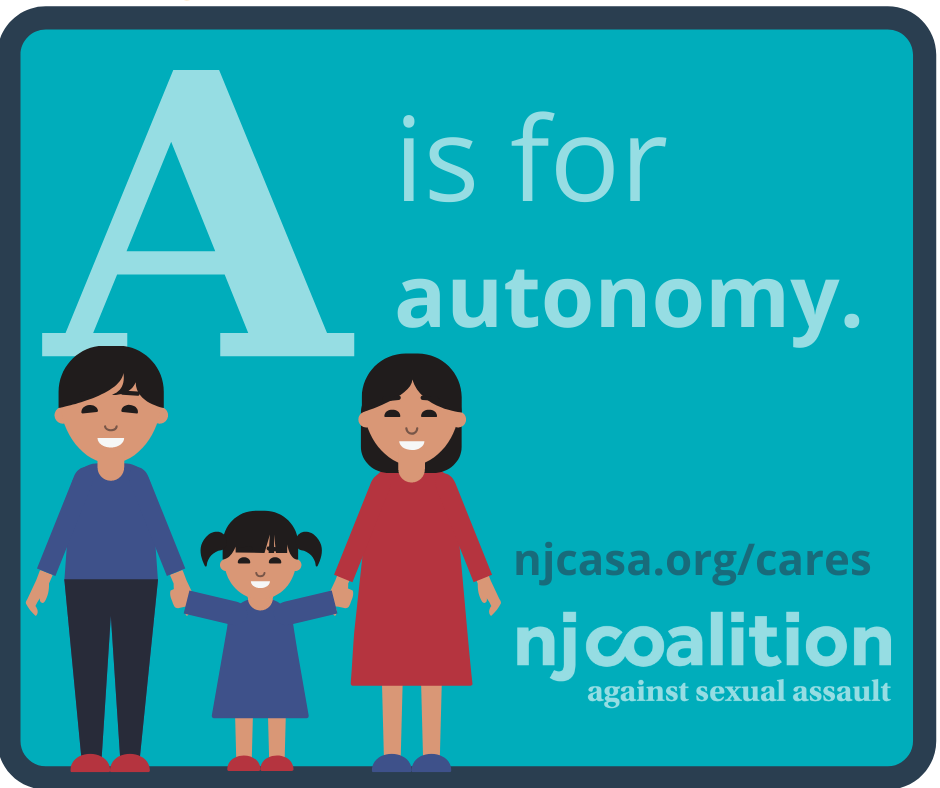Many of our day-to-day routines are looking different as the COVID-19 pandemic continues to develop. As we adjust to new schedules and set-ups for work and school, we have a good opportunity to practice and instill lessons about autonomy with the young people in our lives.
Understanding what autonomy is and how to respect other’s personal choices is a fundamental building block of sexual violence prevention. When we teach the children in our lives to respect others’ autonomy and emphasize their right to make choices about themselves and their bodies freely and without pressure, we lay the foundation for lessons about consent and sexual violence prevention.

Helping children identify their own boundaries and how to respect those of others can ultimately build their emotional health and empathy – both of which are factors in preventing sexual violence, according to the Centers for Disease Control and Prevention.
Lessons on autonomy usually focus on the physical aspects of setting boundaries and respecting people’s choices – for example, asking before giving someone a hug or not pressuring someone after they reject a kiss. Although we’re experiencing new restrictions on our physical movement and interactions with others during COVID-19, we can still set an example for respecting autonomy and help the children in our lives exercise their own agency.
- Empower kids with autonomy on devices. As many of us adjust to doing most of our work, schooling, and socialization online, it’s important to balance monitoring children’s online safety with modeling respect for their privacy. Part of respecting your child’s autonomy is trusting your child. You can start by having open conversations and working together to set ground rules that you both agree on. Sometimes setting an account to private and monitoring followers can help with that personal sense of security– but always remind your child that it’s never their fault if someone harasses them online, whether their profile is private or public.
- Empower kids with autonomy in sharing. Many of us are staying connected right now by posting photos of friends and funny anecdotes about family members on social media. But it’s important to recognize that people have different comfort levels for sharing online. You can establish and respect autonomy by asking your child for permission before sharing photos and stories about them online and encouraging them to do the same with their friends.
- Empower kids with autonomy in relationships. During this time of physical distancing, friends and family are keeping in touch by texting, calling, and FaceTiming. You can set an example for respecting people’s autonomy by encouraging your kids to ask their friends if they want to chat before reaching out. We can remind them that it’s okay to want to spend time alone and that if they’re not in the mood or unsure if they want to chat with friends, there’s no pressure to do so. This can help your kids understand that they have agency and the ability to say “no.” Make sure to note that there might be situations where saying “no” can feel difficult or impossible – for example, if your children might be afraid to say “no” to an adult or have cognitive or physical limitations and differences that make it harder to communicate that “no.”
Creating a world free from sexual violence starts with putting principles of prevention into practice in our day-to-day lives. By respecting the autonomy of the kids in our lives and helping them understand the importance of personal boundaries, we can empower them to exercise their own agency and equip them with the tools they need to grow into empathetic adults.
Want to learn more about digital consent and respecting autonomy online? Check out these resources!
This blog is part of the NJCASA C.A.R.E.S. initiative.
Sharing is caring! Review our sharing policy.
